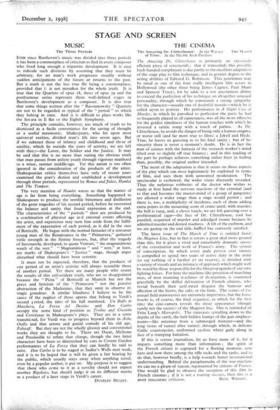The Amazing Dr. Clitterhouse. At the Warner The NI Arch
THE CINEMA
of Time. At the Marble Arch Pavilion The Amazing Dr. Clitterhouse is primarily an extremely efficient piece of screencraft ; that it transcends this possibly back-handed compliment is due partly to the excellent adaptation of the stage play to film technique, and in greater degree to the acting abilities of Edward G. Robinson. This gentleman may be rated as one of the four really intelligent film actors in Hollywood (the other three being James Cagney, Paul Muni and Spencer Tracy), for he adds to a not uncommon ability to conceal the perfection of his technique an altogether unusual personality, through which he commands a strong sympathy for the character—usually one of doubtful morals—which he is called upon to portray. His performance in A Slight Case of Murder, in which he parodied to perfection the parts he had so frequently played in all earnestness, was all the more effective for the golden timeliness of the human touches with which he invested a satiric romp with a touch of pathos. As Dr. Clitterhouse, he avoids the danger of being only a human enigma, or worse still (and far more true to films) a Jekyll and Hyde. True, he leaves us guessing as to his final sanity ; but of his sincerity there is never a moment's doubt. He is in fact the man of science with the fantasia of the research worker's mind tilted ever so slightly off true balance ; and in this reading of the part he perhaps achieves something rather finer in feeling than, possibly, the original author intended.
The merit of the adaptation is that it seizes on those aspects of the play which can most legitimately be exploited in terms of film, and uses them with unwonted moderation. The spectacular is eschewed, the wider vistas discreetly revealed. Thus the nefarious robberies of the doctor who wishes to study at first hand the nervous reactions of the criminal (and to that end becomes the master-mind of a group of gangsters) are allowed a wider range than a stage would permit ; and there is, too, a multiplicity of incidents, each of them adding extra points to the mounting score of crime until, with murder, the bell is rung, and, a clever touch, we are left guessing over a problematical cigar—the face of Dr. Clitterhouse, cool but puzzled, acquitted of murder and adjudged insane because he admitted murder and denied madness. A tilt of the eyebrow, and we are gazing on the end title, baffled but curiously satisfied.
The latest issue of The March of Time is entitled Inside the Maginot Line, but in fact it covers a great deal more ground than this, for it gives a vivid and remarkably dramatic survey of the constitution and work of France's army. The system of conscription, by which every male person over twenty is compelled to spend two years of active duty in the army (to say nothing of a further 27 on reserve), is detailed with a variety of visuals and an intimacy of approach which might well be noted by those responsible for the film propaganda of our own fighting forces. For here the machine-like precision of marching men, of men manning machines of destruction, is countered gracefully by the skilful delineation of French citizens, who reveal beneath their uniformed disguise the humour and affection of the bistro, the cafe, or the farm. The scenes of the annual field manoeuvres are extremely impressive, but the bonne bouche is, of course, the final sequence, in which for the first time the cine-camera reveals the inner appearance (though surely not the secrets) of the Maginot line. One is reminded of Fritz Lang's Metropolis. The staircases spiralling down to the depths of the earth, the half-hidden humps of the gun emplace- ments—like antennae from a submerged monster—and the long vistas of tunnel after tunnel, through which, in delicate Gallic counterpoint, uniformed cyclists whizz gaily along in face of a tramping battalion.
If this is screen journalism, let us have more of it, for it imparts something more than information ; the spirit of the French citizen is captured for a fleeting moment, now here and now there among the rifle racks and the tanks, and to do that, however briefly, is a help towards better international understanding. Behind the paraphernalia of the war-machine we can see a gleam of reason, represented by citizens of France. One would be glad to observe the reception of this film in French cinemas ; if it is not a roaring success, then this is a


























































 Previous page
Previous page